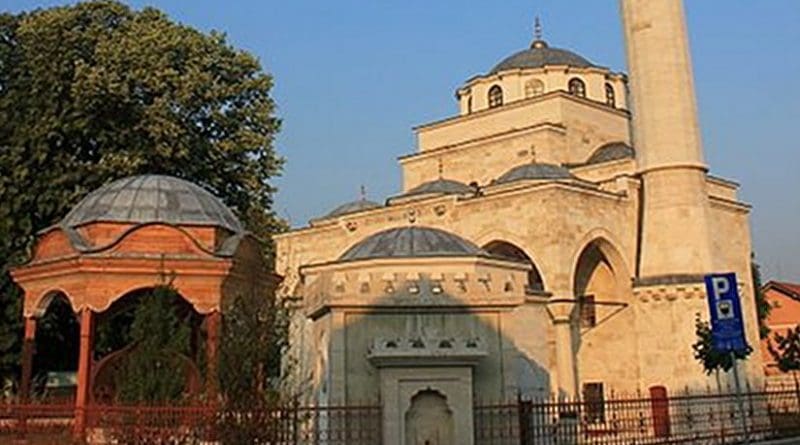Historic Bosnian Ferhadija Mosque Reopens Amid Heavy Security
By Danijel Kovacevic
The Bosnian Serb leadership laid on tight security for the grand reopening of a historic Ottoman-era mosque in Banja Luka, restored after being demolished by Serb forces during wartime.
Bosnia’s top leaders and international dignitaries including Turkish Prime Minister Ahmet Davutoglu joined some 8,000 visitors who gathered on Saturday at the grand opening of the rebuilt Ferhadija mosque, which was one of the landmarks of Banja Luka for centuries before it was levelled during the war.
More than 1,000 policemen from Bosnia’s Serb-dominated entity of Republika Srpska, in close cooperation with the country’s other security agencies, established checkpoints at all the entrances to Banja Luka and closed the centre of the city to traffic long before the ceremony began.
“Just as Ferhadija today opened its doors to believers, we should be opening doors to each other, and this should be our main message for today and for our future,” the Bosniak member of Bosnia’s presidency, Bakir Izetbegovic, said in a speech.
“The opening of Ferhadija today is not the opening of just another mosque. Ferhadija is the message of peace to all citizens of Bosnia and Herzegovina and to the whole world,” outgoing Turkish premier Davutoglu said in his address.
The Ferhat Pasha Mosque, built in 1579, was one of the most significant Ottoman architectural achievements in Bosnia and Herzegovina but was razed to the ground by Bosnian Serb forces in 1993 despite being protected by UNESCO.
Although Banja Luka saw little combat during the Bosnian war, all 16 mosques in the city, of which Ferhadija was the most famous, were destroyed.
Serb militiamen blew up the Ferhadija mosque on the night between May 6 and 7, 1993, and the levelled site was turned into a parking lot.
Saturday’s ceremony was seen as an opportunity for the Serb authorities in Banja Luka to project an image of post-war tolerance, and it passed off without incident despite continuing ethnic tensions in Republika Srpska, which erupted last year at the annual Srebrenica memorial event where Serbian Prime Minister Aleksandar Vucic was pelted with stones and bottles.
“This is one of my happiest days this year,” said a man who gave his name as Damir, a Bosniak who was born in Banja Luka and remained there, living near Ferhadija, for almost the entire duration of the war.
The explosion which destroyed the Ferhadija mosque, was so strong that it also shattered the windows on his apartment, he recalled.
Although he now lives in Denmark, he said he decided to visit Banja Luka for the reopening.
“Although I am not a truly devoted believer and although I stopped thinking about ever returning to Bosnia a long time ago, the reopening of the Ferhadija mosque made me reconsider all that,” he told BIRN.
The first post-war attempts to reconstruct the mosque were met with violence.
After the conflict ended, representatives of the Islamic community in Banja Luka requested and in 2001 received a building permit for the reconstruction of the mosque, but this sparked strong resistance from Bosnian Serbs.
The ceremony at which the cornerstone for the reconstructed mosque was laid took place on the eighth anniversary of its destruction, on May 7, 2001, but was followed by riots by Serb nationalists.
A group of about 1,000 extremists participated in the violence, throwing rocks, burning vehicles, prayer rugs, a nearby bakery owned by a Bosniak family and the flag on the local Islamic centre, hoisting the Bosnian Serb flag in its place.
Around 250 people were trapped in the Islamic centre including the head of the UN in Bosnia and Herzegovina, Jacques Klein, and ambassadors from Britain, Sweden and Pakistan who were eventually freed by Bosnian Serb police. By the end of the riots, one Bosniak had been killed and more than 30 people injured.
The date, May 7, was subsequently chosen as Bosnia and Herzegovina’s official Mosques Day.
After 2001, the reconstruction of the mosque was delayed by the requirements for the reconstruction work to restore its authenticity, as well as by the high costs – originally estimated at around six million euros.
Financial issues held up the project until Bosnia’s Islamic Community signed a contract with the Turkish International Cooperation and Coordination Agency, which financed the remainder of the work.
It was completed in 2015 and then the grand opening was scheduled for May 7 this year to coincide with the anniversary of its wartime demolition.

